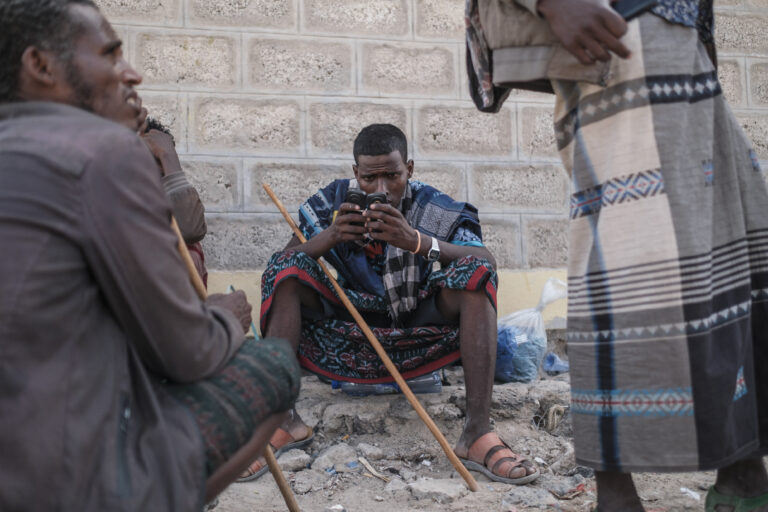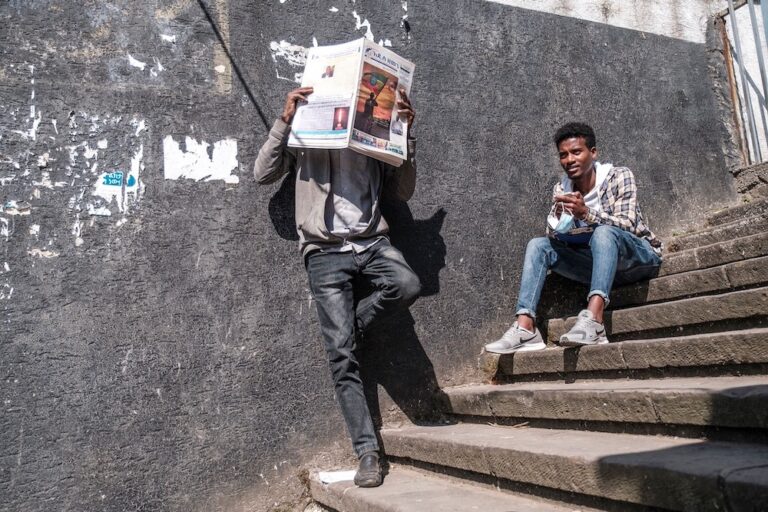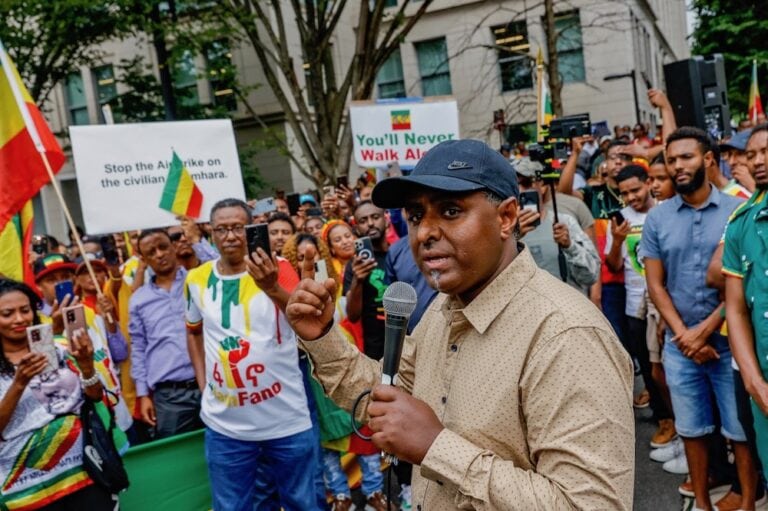(HRW/IFEX) – The following is a Human Rights Watch press release: Ethiopia’s Educated Suffer Government Repression (New York, January 24, 2003) – The Ethiopian government is muzzling educators and students with a policy of harsh repression that includes extrajudicial killings, arbitrary arrests, and widespread denials of freedom of opinion and association, Human Rights Watch said […]
(HRW/IFEX) – The following is a Human Rights Watch press release:
Ethiopia’s Educated Suffer Government Repression
(New York, January 24, 2003) – The Ethiopian government is muzzling educators and students with a policy of harsh repression that includes extrajudicial killings, arbitrary arrests, and widespread denials of freedom of opinion and association, Human Rights Watch said in a report released today.
As an important strategic ally in the U.S.-led war on terror because of its position in the Horn of Africa, Ethiopia has escaped international censure for many of these violations.
“Ethiopia’s security forces have targeted students and teachers because they are among the most politically active elements of Ethiopian society,” said Saman Zia-Zarifi, academic freedom director for Human Rights Watch. “Ethiopia is on the brink of another famine, and it needs educated people to lead the country out of this disaster.”
The 52-page report, “Lessons in Repression: Violations of Academic Freedom in Ethiopia,” documents an ongoing pattern of impunity among federal and state security forces accused of using excessive lethal force to disperse protests by unarmed high school students and other civilians. For example, five high school students were killed protesting economic conditions in Oromia state last year and hundreds of students, teachers, and other intellectuals arbitrarily arrested. The state government claimed it could not afford to use non-lethal means of crowd control like teargas or water cannons, and threatened to continue to shoot students if they continued protesting.
“There is no excuse for shooting unarmed students or civilians exercising their rights,” Zia-Zarifi said. “The United States and the United Kingdom should question the value of allying with a government that is so callous in dealing with its own citizens.”
In April 2001, students at the capital’s Addis Ababa University (AAU) went on strike to demand academic freedom, including the right of the student union to meet and publish a newspaper. Federal Special Forces quelled their demonstrations with excessive force – storming the campus, killing more than forty, and arresting thousands. The government admitted wrongdoing but has not prosecuted those responsible.
Today, a climate of self-censorship reigns at AAU, as on other campuses. Having been forced to drop their demands for academic freedom, AAU students went back to school a year after the strike. Professors say they curb independent political speech and activity because they are government employees who can be fired at will.
The government has imposed a system of evaluations known as “gimgema,” which may be used to pressure academics to tout the ruling party’s ideology. Some of the university’s most distinguished professors resigned last month in protest of the gimgema system.
The government has also continuously harassed the independent Ethiopian Teachers’ Association (ETA) over the past decade, arresting the union’s leaders and some of its members, confiscating its assets and property, and threatening teachers who support the union. Teachers, who represent the largest educated population in the country, have been critical of education policy and other government policies.
The government has used similar tactics to repress civil society groups, including the Ethiopian Human Rights Council, and journalists in recent years. Taken together, these actions create an environment strongly hostile to independent thought.
The report is available online, at:
http://hrw.org/reports/2003/ethiopia0103/
TESTIMONIES FROM “LESSONS IN REPRESSION: VIOLATIONS OF ACADEMIC FREEDOM IN ETHIOPIA”
About the chilling effect of human rights violations on students and educators
We can’t complain publicly or we will be arrested. The students are afraid of such things. Not only the students. We teachers, too.
-Schoolteacher, July 30, 2002
About detention and torture after the 2001 AAU strike
They pushed me into a police car and took me to an unknown placeâ¦. Once we arrived at the compound, they pulled me out of the car. They started beating me everywhere. They slammed me on my ears, and blood started to come out. They beat me on my back, legs, arms and hands. I don’t know how I spent that night-I was unconscious much of the timeâ¦. The officers tied my hands and my ankles together with rope. They threw me down into the sand, and at night they torched me with electricity. When they beat me, they did it with a stick. They pushed my head into a bucket of water so I could not breathe, and I was so weak I couldn’t resist, and my hands were tied together. The hardest thing for me is that those people knew my feelings, they were also Ethiopians. They
knew what they were doing to me … They tortured me like that for three days.
-Student refugee, Nairobi, April 4, 2002
About ongoing harassment against the Ethiopian Teachers’ Association
Teachers are expected to … follow the [ruling party] line, or else they will be blacklisted. To be blacklisted includes not getting promoted, not getting a salary increase, being transferred to remote areas, being transferred away from your family, having your salary docked, losing your housing, getting fired, and even being excluded from social events like weddings … I was blacklisted three times.
-Former teacher now refugee, Nairobi, July 10, 2002


